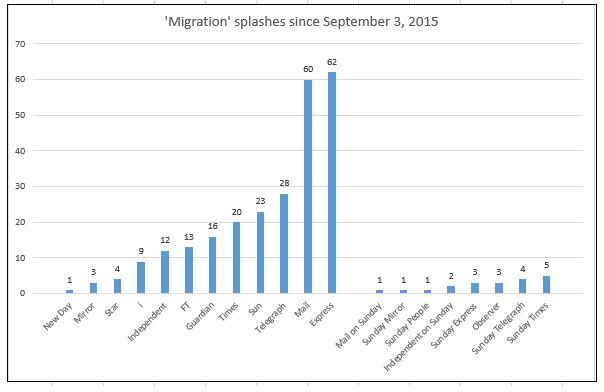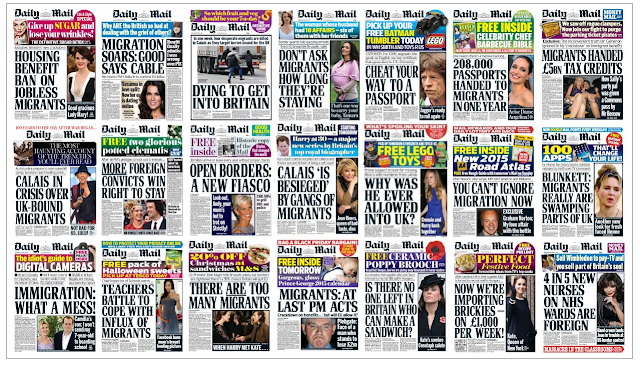You could almost touch the schadenfreude as big-name advertisers walked away from YouTube after finding themselves appearing alongside extremists.
"At last!" proclaimed a Daily Mail leader hailing the "fightback against web anarchy". Google (which owns YouTube) rightly stood accused of profiting from hatred, it said:
Day after day, the already deeply tarnished reputations of the filth-peddling, tax-dodging terror-abetting internet behemoths sink lower into the mire.For many years, Google, Facebook and Twitter had wilfully turned a blind eye to poisonous content, it continued. But now the day of reckoning had arrived. The BBC and Whitehall had pulled their ads. And when banks, supermarkets and Marks & Spencer joined the exodus, there was more from Dominic Lawson on the "utter shamelessness of the filth-peddling web giants".
For The Times, which set the ball rolling with an investigation by Alexi Mostrous, this was the "shaming of Google", which should now face up to its responsibilities. The alternative was "an unacceptable role as an accessory to barbarism".
The Mail and the Murdoch stable hate the internet giants because they think they are stealing their revenue and readers. Having had the field to themselves for more than 200 years, newspapers resent the interlopers. Free marketeers all, they just can't stand competition. It's the same as their gripes against the BBC (publicly funded left-wing propaganda - just look at that anti-Brexit Countryfile with the farmer saying he'd go under without migrant fruit pickers) but writ larger.
Essentially, their cry is "It's not fair!"
Murdoch titles dominate the British print media and his Sky channels dominate the satellite television market. The Sun and Times reach 31 million people a month, according to the National Readership Survey, and figures from the British Audience Research Bureau suggest that the Sky channels between them achieved a total audience of about 8 million last week. The Mail is the most successful news website in the world and its print and online offerings now reach 29 million a month. But they want more.
Murdoch not only wants full control of Sky, but he wants the opposition nobbled. Having moved into BT's world of telephones, he started complaining - through his newspapers - that it was anti-competitive for BT to have control of the cabling. And when a deal was reached with Ofcom for Openreach to be hived off as a separate company under the same umbrella, that still wasn't enough. He wants an enforced sale.
The "respectable" argument is that BT is failing to invest enough in improving broadband speeds - a view that SubScribe wholeheartedly endorses - but it's hard not to notice that BT Sport has been outbidding Sky for key football rights.
The fight with Google goes back even further, with Murdoch threatening in 2009 to remove his newspapers' content from the search engine in a row over free access. That was followed in 2014 by News Corp's appeal to the much-derided European Commission for action to combat what it called "a platform for piracy". Then came the furore over tax in January last year. Mostrous, who had been honoured for his work on celebrity tax avoidance in 2015, was again on duty for The Times, showing how little tax Google paid and how the Government had failed to get as much as other European countries out of the company.
It was a legitimate investigation - if a bit rich from a paper whose parent company had previously managed to pay not a penny of UK corporation tax on billions of pounds of income over a period of 11 years.
The latest assault is also a valid inquiry - the speed with which MPs and big businesses responded proves as much - and it has thrown up three distinct strands:
- the content itself;
- the algorithms that place advertisements alongside extremist videos;
- the fact that money generated by the ads goes to the video makers and so funds extremism
One of the biggest beefs of the Mail and the Sun is that the internet is not regulated. British newspapers, they say, are subject to the toughest regulatory system in the world. They invest money in journalism and strive for accuracy, but their very existence is being imperilled by people like Gary Lineker who can reach millions with a tweet that turns out to be misinformed. And don't get them started on fake news. (Well, actually, they’ve already started with the News Media Association’s submission to the Culture, Media and Sport Committee’s inquiry saying there should be a government investigation into Facebook and Google – but “don’t bring in any new rules for us”).
The Mail warmed to that theme in its leader on Saturday, accusing the web giants of ruthlessly invading the privacy of their users by gathering and exploiting personal information, going on: "Meanwhile, endless fake news and blatant libels are spread with impunity around the world."
Impunity? They must have short memories in Kensington, for only days before the Mail Online's own columnist Katie Hopkins had to pay libel damages and costs over a tweet.
For a technophobe who does not use a computer, Mail editor Paul Dacre seems remarkably well-informed about the "vile" material all over the web and its malign effects on society. His newspaper has run hundreds of stories on the subject and appears to be of the opinion that all such material – porn, fanaticism, body-shaming - should be removed. Yes, some of it is execrable, but wouldn’t that be censorship, an attack on free speech?
The advertisers seem more concerned about their good name than about removing content from the web. They don't want to be associated with inappropriate material. If Google cleans up its algorithms, they'll go back.
Then there's the notion that advertisers and their customers (and, in the case of Whitehall and the BBC, the taxpayer) are inadvertently funding hate because a proportion of the fees they pay ends up in the hands of the people producing the page on which their ad appears.
The papers say this adds up to hundreds of thousands of pounds. Google says it is "pennies".
[SubScribe can attest to the fact that Google is not exactly generous in sharing the proceeds of web ads with the page producers, but then again SubScribe does not get millions of views, so please click on an ad or two!]
The papers say this adds up to hundreds of thousands of pounds. Google says it is "pennies".
[SubScribe can attest to the fact that Google is not exactly generous in sharing the proceeds of web ads with the page producers, but then again SubScribe does not get millions of views, so please click on an ad or two!]
So the Mail could be said to be in favour of the ad boycott to force the removal of material that spreads hate and fear.
Wait a minute. Funding hate? Ad boycotts? Material that spreads hate and fear? Doesn't all that sound familiar?
For the past eight months a group called Stop Funding Hate has been trying to persuade household names not to advertise with the Mail, Sun and Express while they continue to run so many anti-immigration stories. It chose those three papers because they were called out by the UN for the tone of their coverage. The organisation - which has just raised more than £100,000 through a crowd-funding appeal to expand its work - argues that it is not good for companies to be associated with such a material, that the newspapers are profiting from spreading hate and fear, and that by advertising with the newspapers, advertisers are effectively using their customers' money to fund those hate messages.
This is what the Mail had to say in a leader about that:
A more malicious threat comes from Left-wing campaigners who seek to blackmail firms into withdrawing advertising from newspapers with which they disagree.Thus far, only Lego and the Body Shop have shown tangible support for the SFH campaign. Most other advertisers, including some that have pulled away from Google, have responded along the lines that they have no say in what appears near their ads.
Particular targets are those, like the Mail, which voice public concerns about mass unrestricted immigration and the wanton waste of taxpayers' money on overseas aid, while the elderly and vulnerable suffer at home.
But with fair-minded companies refusing to be bullied by groups such as Stop Funding Hate, this assault on free expression can also be overcome.
But their reaction to the Google "scandal" proves that they think they do - or at least that they do not want to be seen next to material that runs counter to their brand image. That is exactly the judgment SFH is asking them to make about the newspapers.
Let’s be clear:
- It is censorship for campaigners to ask advertisers to influence the mindset - as opposed to the specific content - of newspapers.
- It is not censorship for the Press to demand that Google removes material from its platforms.
- It is not censorship for advertisers to seek to influence what appears on Google’s websites.
Of course it's all a question of scale. There are some really bad people on the web advocating some really nasty stuff. We can see how lives could be put at risk, so it's an easy call for M&S to say it doesn't want to be shown alongside real people with real guns and bombs (as opposed to the ones in Homeland).
It's harder to take a stand against a stream of prejudicial headlines, especially when those headlines are delivering the very Middle England readership it wants to talk to. But there is evidence from a number of respected sources, not simply lobbyists, that lives are being blighted - and possibly endangered - by some of things printed in our newspapers. A lot of blind eyes are being turned.
Richard Wilson, who set up SFH, is encouraged by this week's developments, saying:
We think it's brilliant that there is now a serious discussion about hate speech and about the responsibility of advertisers to acknowledge their role in it. Obviously this is a major concession from the previous position of insisting that any suggestion advertisers should consider these things was an abuse of free speech. Even the Mail now accepts that advertisers do have to think about this and act accordingly.
The Mail would naturally argue that that it does not print "hate speech". But here's a thing. In listing obviously offensive and extremist videos from "terror groups, neo-Nazis and homophobes", the Mail reported:
An investigation by The Times found that the Home Office, Royal Navy and Royal Air Force all had advertising promotions placed beside video rants from 'shock-jock' Michael Savage, who infamously told one gay caller he should 'get Aids and die'.
The often-offensive Savage Nation podcasts pull no punches, but they come with a health warning of "adult content, adult language and psychological nudity", and they are sufficiently mainstream for the presenter to have been inducted into the radio hall of fame last November.
If it is reasonable for advertisers not to want to be associated with his output, what about the output of a woman (Katie Hopkins) who calls refugees cockroaches or a man (Kelvin MacKenzie) who thinks it's outrageous for a newsreader wearing a hijab to report on a terrorist attack - both "vindicated" by the toughest newspaper regulator in the world?
Postscript:
In taking the Google story on from the Times's findings, the Mail also reported that Google, Facebook and Twitter had been "branded morally bankrupt for hosting thousands of images showing youngsters how to starve themselves or self-harm". It helpfully reproduced a photograph of a thin young woman. There is a real problem of mental health issues among teenagers and pro-anorexia sites exacerbate it. The Mail has written a fair bit about the tyranny of fashion and size zero models, but it would never do anything to make women worry about their body image, would it? This collection was taken from half - yes half - of yesterday's "sidebar of shame".
And one last thing:
The Mail also reported concerns about Google's "political clout" and its "cosy relationship" with Whitehall, as evidenced by figures showing that the company had at least 27 meetings with ministers in the 17 months after the 2015 election. There was also a "revolving door" that had seen at least 26 Whitehall staff hired by Google in the past decade.
Murdoch made a similar point in January last year, when he tweeted that Google was infiltrating Downing Street and the Obama White House.
Those Google meetings included one with David Cameron and another with Theresa May when she was Home Secretary. Over the same time period, executives of News Corp held 20 meetings with senior government ministers, 18 of them with the Prime Minister, Chancellor or Culture Secretary. Murdoch attended seven. His chief executive, the former Times editor Robert Thomson, was at eight.
Pots and kettles.
SubScribe has analysed coverage of immigration and related issues over 2016. You can read about the front pages here and about the white-top inside pages here.


















































